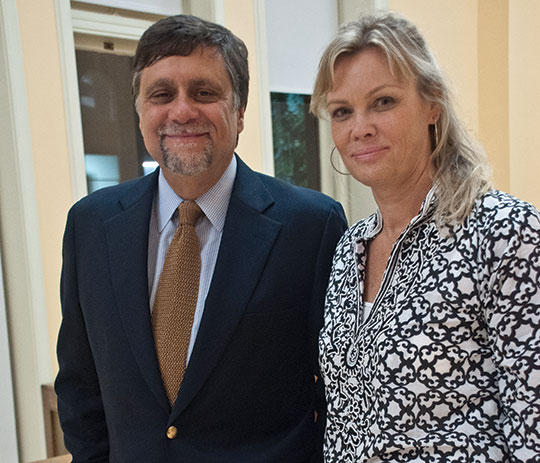A Different Kind of Health Insurance
John Allegrante was a 26-year-old Ph.D. student at the University of Illinois Urbana-Champaign when his father was diagnosed with serious heart disease. But the real shocker came a few days later, when Allegrante walked into his father’s hospital room back home in Poughkeepsie, New York.
“He said, ‘Get me out of here, I can’t afford this,’” recalls Allegrante, now Professor of Health Education and Deputy Provost at TC. “He was a self-employed barber, and it turned out he had no health insurance.”
Allegrante was so upset that he fired off a long letter to The New York Times about the injustices of a society in which hardworking people could find themselves unable to pay for medical care. To his surprise, the Times printed an edited version of the piece on its opinion page, under the headline “Well, Who Needs Life Savings?” President Jimmy Carter read it and invited Allegrante to Washington to talk with his special health adviser. A hospital on Long Island offered Allegrante, Sr. free medical care.
Even before his father’s illness, Allegrante had resolved to pursue a career in health education. Still, his father’s revelation gave him a different kind of connection to what he had been studying.
“I started thinking about the relationships among behavior, wealth, status and health outcomes, and about the limitations of our health care system.”
During the past 30 years, Allegrante has coauthored an “action textbook” on teen health; been a frequent guest on radio programs and a contributor to journals and lay publications; and collaborated extensively with health education and public health researchers in Iceland.
“We have a lot to learn from the Nordic countries that have come to a political consensus about the morality and practical economic value of making health care a basic human service, available to all,” he says. “The investments they have made are making a huge difference.”
As editor for the past two years of the journal Health, Education & Behavior, Allegrante has also published a number of studies and commentaries focused on patient self-management.
Meanwhile, at TC, since 1998 he has led a yearly delegation of students to Capitol Hill to lobby Congress for additional federal
funding for the U.S. Centers for Disease Control. And since becoming the College’s Deputy Provost in 2009, Allegrante has founded and hosted a new colloquium called “Health, Behavior and Society,” in which guest speakers examine the interconnections among biology, behavior
and environment in relation to health.
Above all, he has influenced generations of students to think about health education issues.
One of those students, Janey Peterson, is now a clinical epidemiologist and behavioral scientist at Weill Cornell Medical College – a career path she traces directly to her mentor. Peterson originally trained as a nurse and worked in cardiothoracic intensive
care during the 1980s. The waves of elderly patients with chronic illnesses who flooded her unit convinced her that the system
wasn’t working.
“If you look back at how hospitals have managed patients with cost-driven diseases, you see that they’ll monitor you for a single condition, like diabetes,” Peterson says. “But if you have, for example, diabetes, heart disease, a cellulitis on your leg, and depression or cognitive issues – which is a really common scenario – there’s no one who will manage everything together, and the caregivers aren’t talking to each other. The reimbursement system isn’t set up for it.”
But it wasn’t until she became involved in a study led by Allegrante, teaching patients with arthritis to manage their own care, that Peterson began to see the glimmer of an answer.
“John was a role model for me, and he really stimulated me to learn more about working with people and their behaviors,” Peterson says. “Because of him, I began thinking about questions like, How do people take charge? Particularly people who are used to a doctor telling them what to do?”
Fifteen years passed before Peterson enrolled as Allegrante’s doctoral student at TC. Now they’ve worked together on a study that represents some of the most advanced thinking in their field.
“Health educators find ways to operationalize behavioral strategies,” Allegrante says. “That’s what we do. It’s especially satisfying when you have a chance to prove that they can work.” — JL
Published Friday, Dec. 7, 2012
